FIFA WORLD CUP 2022
Why Messi is now better positioned to claim victory at the Qatar football spectacle
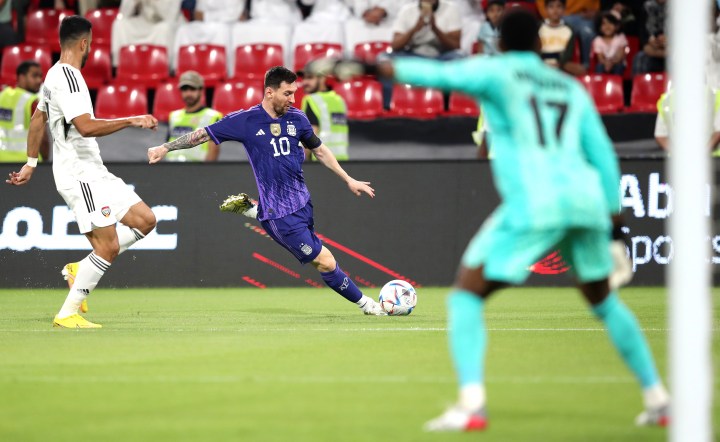
Lionel Messi, one of the greatest players of all time, needs a World Cup win to cement his status as perhaps the greatest of all time.
“I saw Messi nervous only once,” revealed former Argentina teammate and Manchester United midfielder Juan Sebastian Veron. “And it wasn’t on a football pitch.”
Ahead of their 2010 World Cup opener against Nigeria, manager Diego Maradona gave Messi the captain’s armband for the first time in his life.
“The leadership duties in-game were not making Messi uncomfortable,” explained Veron, one of Messi’s closest confidantes back then. “It was the fact he had to figure out and execute a speech in front of everyone before the game.”
A lot of water has gone under the bridge since that moment. Twelve years on from that day in Johannesburg, Messi is a different character.
This month, Netflix launched – in Latin America exclusively – the documentary Sean Eternos: Campeones De America (Be eternal: Champions of America). Footballers and coaching staff narrate the in-and-outs of the journey which saw Argentina win the Copa America in Brazil last summer.
A particular scene stood out from the trailer.
Messi gathered all his teammates in a circle inside their dressing room ahead of the final against the hosts at the iconic Maracana Stadium in Rio de Janeiro. What followed was a speech for the ages.
“Coincidence does not exist, lads. This trophy had to be played in Argentina [they were meant to co-host with Colombia only for the tournament to be delayed by a year and then moved to Brazil because of the pandemic], but you know what? God brought it here just because we can win it here and lift the trophy in Maracana, to make it more beautiful. So let’s get out full of confidence and don’t worry, because we will take this one back home. Vamos!”
The whole squad melted into a victorious shout. Those two speeches, the first back in 2010 and the second in 2021, pretty much sum up Messi’s evolution in the national team.
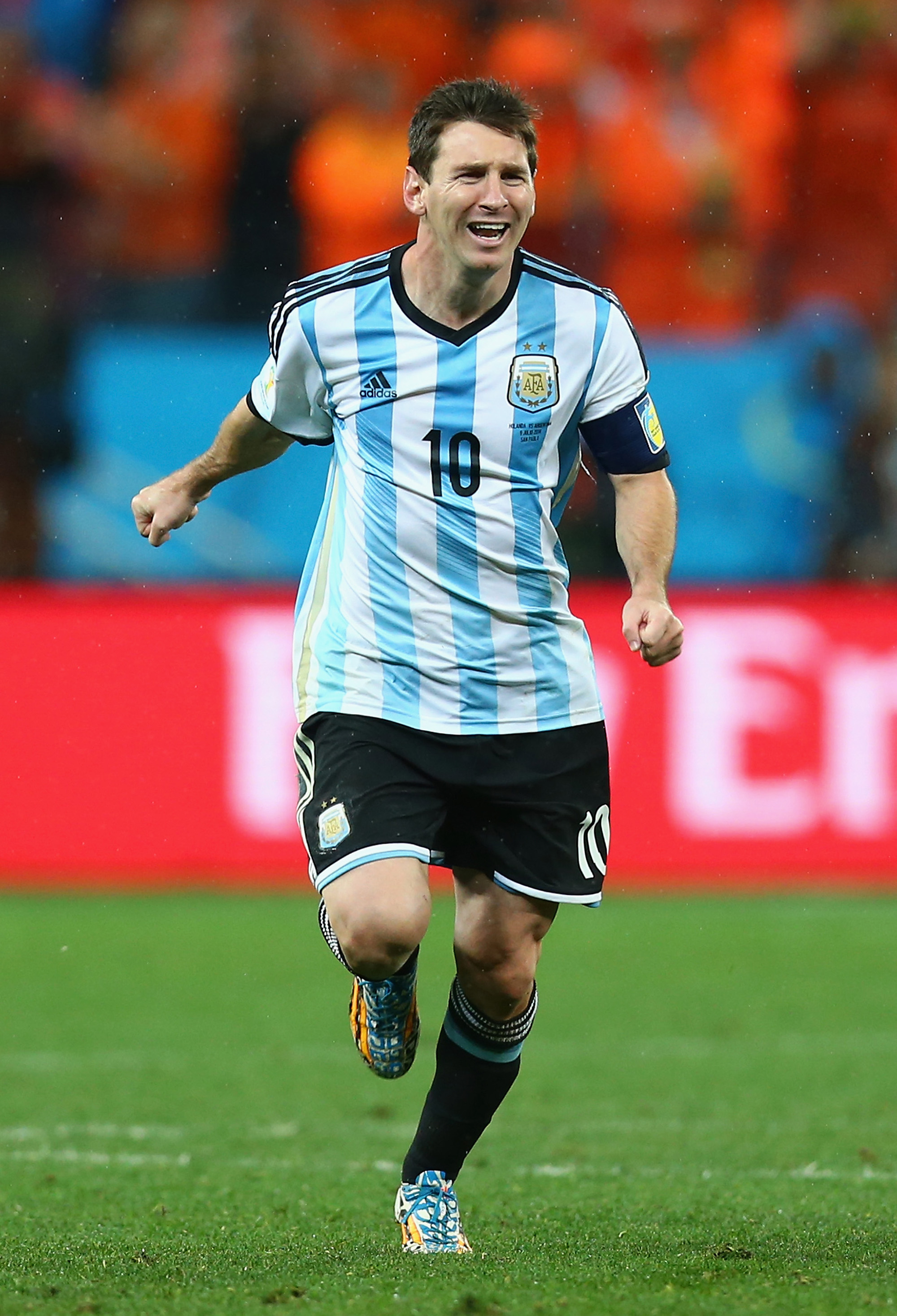
Lionel Messi of Argentina celebrates defeating the Netherlands in a shootout during the 2014 Fifa World Cup Brazil Semifinal match between the Netherlands and Argentina at Arena de Sao Paulo on 9 July 2014 in Sao Paulo, Brazil. (Photo: Ronald Martinez / Getty Images)
Boy to man
From the player who stuttered and wondered how to put some words together in South Africa to the absolute boss of a hungry generation.
From the young kid who made his international debut after becoming a star in Barcelona to the man who arrives at his last chance at the right moment.
Lionel Messi is now 35 years old. This is going to be his fifth World Cup — also his last, according to him — and some football fans might be entitled to think he is past his best days as a footballer.
But there are plenty of reasons to believe this is the strongest chance he’s had of winning the trophy.
Until now, it has been the one thing that has eluded him.
2005-06 stats with Barcelona
25 games
8 goals
5 assists
La Liga winner
Champions League winner
Germany was ready to witness the breakthrough of a 19-year-old who proved to be one of the most exciting talents in world football. Expectations, as it tends to happen, exceeded reality.
Messi had introduced himself to the world that season with scintillating displays, such as a masterclass at Stamford Bridge where he tore apart Asier Del Horno – and any Chelsea defender who tried to stop him. His progression, though, was cut short by an injury.

Argentina’s Lionel Messi celebrates after scoring the 3-0 lead during the International Friendly soccer match between Argentina and Estonia at El Sadar stadium in Pamplona, Spain, 05 June 2022. EPA-EFE/Villar Lopez
He missed the last 12 league games of the season with a bad hamstring tear. Messi did not recover in time to feature in the Champions League final win against Arsenal, but was one of the names in Argentina’s squad for the World Cup.
Manager Jose Pekerman did not plan to start him, though. He preferred a more experienced partnership up-front, formed by Hernan Crespo and Carlos Tevez. The latter, more established as a football star back then, had complained about favourable treatment for Messi during the qualification campaign.
“So now he rests and you throw me to the pitch in Uruguay to take all the kicks and blows here?,” Tevez reportedly complained to his manager during those qualifiers.
Messi shone in a 16-minute cameo against Serbia, the second group game, with a goal and an assist. Then he started in the goalless draw versus the Netherlands and played 36 minutes as a substitute as Mexico were beaten after extra time but ended up playing no minutes in the quarterfinal loss to the hosts.
Local fans felt frustrated about Messi’s lack of game time. The media slammed Pekerman for being too cautious with him.
Years later, teammate Leandro Cufre suggested Messi had muscular problems ahead of that Germany game.
Maradona and Messi
2009-10 stats with Barcelona
53 games
47 goals
12 assists
La Liga winner
UEFA Super Cup winner
Club World Cup winner
Ballon d’Or winner
The best Messi and the best Barcelona. The 23-year-old was now starring for one of the best teams the game has ever seen. At international level, though, nothing clicked.
Instead, this was Maradona’s World Cup. Maradona was manager of an Argentina team packed with talent, but lacking in identity. They only secured a spot in South Africa with an 86th-minute winner in the last game of the qualifiers against Uruguay.
The potential of that squad was tremendous, but the chemistry was non-existent. Maradona called up to an incredible 108 footballers during just under two years as national manager.
There was a particular name who stood out among the squad that went to South Africa: full-back Ariel Garce. His international record was one appearance, in a friendly game against Haiti. The myth in Argentina was that Maradona dreamed one night about Garce lifting the World Cup trophy in South Africa and felt obligated to take him.
This was the first major competition with Messi wearing the No 10 shirt, partly because Juan Riquelme had retired from international duty after a fall-out with Maradona.
Argentina were unchallenged in the group stage. In their first serious test, another quarter-final against Germany, Maradona’s team were outclassed and lost 4-0.
Heartbreak in Rio
2013-14 stats with Barcelona
46 games
41 goals
14 assists
No major honours
Argentina lost the final against Germany in Brazil, and Messi was the closest anyone can get to winning a World Cup without actually doing it. Before reaching that point though, a lot of things unfolded.
In 2011, Argentina were knocked out of the Copa America quarter-finals on penalties by Uruguay. That game took place in Santa Fe, the region of the country where Messi was born. The then 24-year-old was booed on his way off the pitch by his own people on arguably one of his toughest nights as a professional.
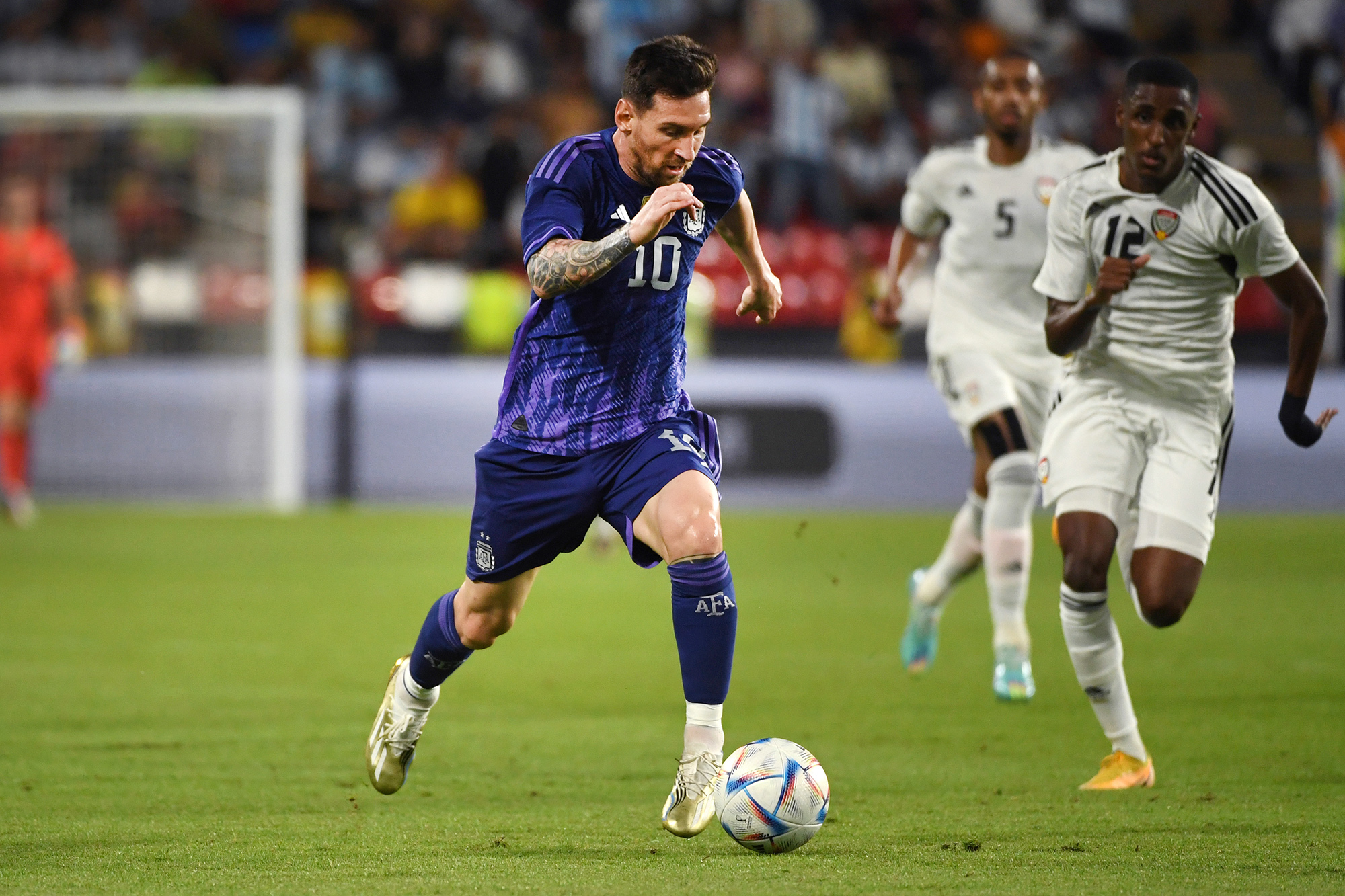
Lionel Messi of Argentina drives the ball during an international friendly against the United Arab Emirates in Abu Dhabi on 16 November 2022. Photo: Martin Dokoupil/Getty Images
In that same match, he got into a big row with his teammate Nicolas Burdisso.
“We had a physical confrontation in the locker room,” former Inter Milan defender Burdisso revealed years later.
“I don’t think I was the only one who ever shouted at him, but things can happen in a locker room. Admittedly, that time we went over the line. We walked into the locker room and when I saw that he was coming over, I waited for him. They had to physically separate us.”
Argentina could not figure out why the best player on the planet could not be the best while representing his country. A section of the fans blamed the fact Messi grew up in Barcelona, far away from Argentinian football, after moving to Catalonia at age 13.
Then, Alejandro Sabella took over as manager. Sabella was a man capable of putting some order inside the dressing room, and finding a balance on the pitch.
The attacking power Argentina had was unrivalled, with Messi, Gonzalo Higuain, Sergio Aguero, Angel Di Maria and Ezequiel Lavezzi, but their main star went to the World Cup far from his best form.
Messi’s numbers were outrageous, there’s no question about that. Barcelona, though, went through a transitional campaign. Tata Martino was the coach, and he struggled to get control of the dressing room. Neymar had arrived and Messi started wondering what his role at the club would be in the future.
Barcelona and Messi started talks to extend his contract, but those stalled at some point and ended up with public accusations exchanged between the player and club executive Javier Faus.
“I don’t see a reason to sign a new contract with Messi,” Faus stated, to which Messi replied: “He knows nothing about football.”
Messi suffered two muscular injuries that season, Barcelona lost the La Liga title in the last game after drawing with Atletico Madrid — who won it instead — at Camp Nou, and he did not arrive in Brazil at his physical peak.
Despite all of that, the 27-year-old got four goals in the group stage.
Messi is still to score a goal in a World Cup knockout tie.
Russian rout
2017-18 stats with Barcelona
54 games
45 goals
20 assists
La Liga winner
Spanish Cup winner
Messi took part in his fourth World Cup under his eighth national manager, which demonstrates the instability he’s lived with as an Argentina player. Maradona, for instance, only had three.
This time, it was Jorge Sampaoli’s turn to make Argentina work. Like the rest, he failed.
The team set foot in Russia full of trauma. They had lost back-to-back Copa America finals (2015 and 2016), both against Chile, which led to Messi announcing his international retirement, tired of pressure, full of disappointment and disheartened by debates such as scrutiny over him not singing the national anthem before games.
He agreed to come back a year later, after calls for it across the country and the demands from his teammates.
Messi was 31 and had gone through a notable year at Barcelona, but the build-up to this World Cup was extremely negative.
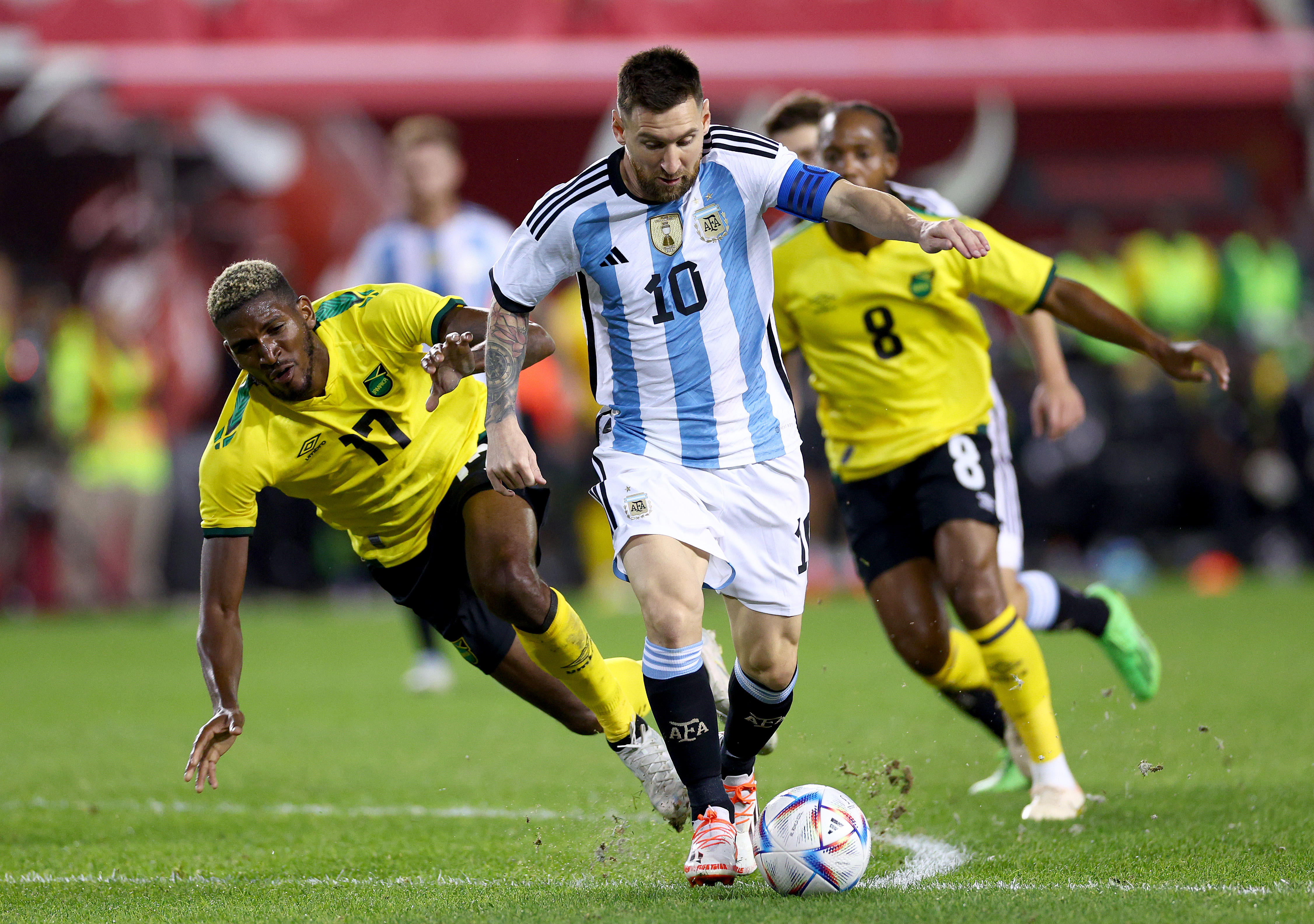
Lionel Messi of Argentina takes the ball as Damion Lowe of Jamaica defends in the second half at Red Bull Arena on September 27, 2022 in Harrison, New Jersey. Argentina defeated Jamaica 3-0. (Photo by Elsa/Getty Images)
Sampaoli’s ideas did not come across well. The manager wanted major changes to formations, the main one being setting up with three centre-halves and wing-backs. Most of the players did not feel comfortable and were unsure about the general approach from their manager.
Things came to a head after a 3-0 loss against Croatia in the second group game. Players, staff and FA executives held an emergency meeting. Messi, as the captain, made Sampaoli aware of the squad’s unhappiness.
“You have asked me many times which players I want to play with, but I’ve never ever mentioned a single name to you, tell me if I’m wrong,” Messi said.
Argentina qualified miraculously with a late winner in the final match against Nigeria but then lost 4-2 to eventual champions France in the round of 16.
Final curtain
2022-23 stats with Paris Saint-Germain
19 games
12 goals
14 assists
Lionel Scaloni’s regeneration of Argentina has been simply liberating for Messi. After the 2018 World Cup it was not just Sampaoli who left but multiple members of the team’s old core and Messi’s most trusted lieutenants – names such as Javier Mascherano, Gonzalo Higuain, Ever Banega and Lucas Biglia.
New coach Scaloni took risks and gave the reins to a younger wave of players: Rodrigo De Paul, Lautaro Martinez, Leandro Paredes, Cristian Romero, Emiliano Martinez … and the chemistry with Messi could not have been any better.
It has been rare to see him having so much fun in training with the national team – let alone seeing all the players going on summer holidays together with their families.

Lionel Messi of Argentina reacts during the 2018 FIFA World Cup Russia Round of 16 match between France and Argentina at Kazan Arena on 30 June 2018 in Kazan, Russia. (Photo: Kevin C. Cox / Getty Images)
So, how did this happen? Firstly, because this is a more mature Messi. He’s been through thick and thin, lost those two Copa America finals and a World Cup final, left the national team and came back. He’s a father. He’s got a different perspective and approach while being part of the dressing room.
But no less importantly, this is the first generation of Argentine footballers who grew up idolising Messi. They are not competitors. They are providers. The team understands what he is and needs, and they all assumed any role needed to make the best player of the country shine.
There are no more doubts among Argentina fans over Messi. No more talk about him not singing the anthem. Not a single whisper about his leadership – let alone dressing-room rows like with Burdisso in 2011.
Messi proved a couple of years ago he’s a different leader when, after the end of the 2019 Copa America, he popped up into the mixed zone to blame CONMEBOL — the South American federation — for Argentina’s loss to Brazil in the semi-finals.
“There’s a lot of corruption. We leave with the feeling they [Conmebol] did not want us into the final. We were ready for more than that,” he slammed.
Populist claims, some would say. But the reality is he channelled feelings an entire country was holding in silence. Messi spoke out loud and clear, from the heart, and not caring about potential consequences. Messi was not a stranger in his country any more.
And so we come back to the very start of this story. Messi’s speeches, and especially the memorable one he gave before securing his dream piece of international silverware.
Copa America 2021 was liberating for him.
It finally unleashed a generational footballer, one who once suffered playing for his country.
Now he’s ready to make everyone else suffer.
This story first appeared in The Athletic.






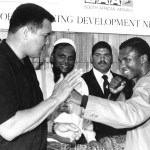



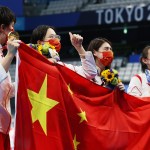









Comments - Please login in order to comment.